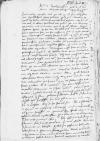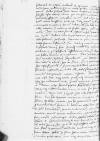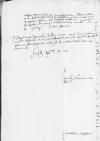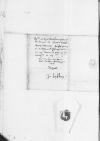List #2940
Cornelis DE SCHEPPER do Ioannes DANTISCUSLondon, 1546-03-24
Regest polski:
De Schepper przeprasza za użycie brudnej karty. Nie miał innej pod ręką, nie chciał jednak utracić okazji do napisania listu. Streszcza swój poprzedni list [IDL 2863], wysłany ubiegłej zimy z Londynu. Posłował wówczas do Anglii w imieniu cesarza, by zabiegać o pokój pomiędzy królami Anglii [Henry VIII Tudor] i Francji [Francis I de Valois].
Zawiadamia, że w listopadzie [1545] obaj królowie wysłali posłów do cesarza, do ugody jednak nie doszło i wojna trwa. Do tej pory De Schepper był w tej sprawie w Londynie czterokrotnie, niewiele jednak osiągnął. Skarży się na porę roku, niesprzyjająca podróżom.
De Schepper prosi o wiadomości. Od dawna nie miał listu od Dantyszka i obawia się o jego zdrowie.
Donosi, że sprawy cesarza [Charles V of Habsburg] nie są zagrożone. Jeśli w Niemczech nie zapanuje spokój, cesarz udowodni, że jest godzien swego urzędu. Liczni odstępcy od wiary starają się wprawdzie wywrócić porządek rzeczy, niedawno jednak umarł ich przywódca Luter. De Schepper życzy podobnego losu wszystkim jego naśladowcom. Wyraża obawę, że również Polska nie pozostanie długo wolna od wpływów luteranizmu. Spodziewa się, że lato będzie niespokojne.
Sobór trydencki wbrew obawom obraduje pomyślnie, jeszcze jednak nie rozstrzygnięto, czy należy najpierw zająć się sprawami dogmatycznymi, czy obyczajowymi.
W sprawach prywatnych De Scheppera nic się nie zmieniło. Żona [Elisabeth Donche], z którą ma syna [Cornelis jr.] i córkę [Anne], wciąż pozostaje życiu. Pasierbica De Scheppera [Catharina Laurijn] ma już dwoje dzieci. Jeden z pasierbów [Matthias Laurijn] wyleczywszy się z ran, otrzymanych podczas bitwy pod Kempekoel (in proelio Sittardiensi), towarzyszył posłowi cesarskiemu Gerardowi Veltwijck do Konstantynopola. Veltwijck pozostawił go tam chorego i nie ma o nim dalszych wiadomości. Drugi pasierb ma się dobrze.
De Schepper przekazuje Dantyszkowi pozdrowienia od posła cesarskiego w Anglii Francisa van der Dilft.
| odebrano Marienburg (Malbork), 1546-05-09 Rękopiśmienne podstawy źródłowe:
Pomocnicze podstawy źródłowe:
Publikacje:
| ||||||||||||||
Tekst + aparat krytyczny + komentarzZwykły tekstTekst + komentarzTekst + aparat krytyczny
Reverendissimo et excellentissimo Praesuli et Domino, domino
Zu
Reverendissime et excellentissime Praesul et Domine, domine et pater honorandissime atque ex animo observandissime.
Quia manum agnoscis eius, qui tibi ex animo fuit eritque filius, non excusabo huius chartae sorditiem, quia, cum nuntiarentur
cf.
De te subdubitare coepi, cum me negligentiae oblivionisque nec sine causa accusaris, quod non scripsissem, ne quominus idem feceris aliqua te valetudo adversa impedivisset. Qua sollicitudine ut me exim{i}as, si fieri potest, quantocius effice.
Res
De re domestic[a] mea nihil dico neque accedit quicquam, neque decrescit Deo gratia, estque haec mediocritas mihi quovis augmento fortunae gratior, tantum mihi fructus peperit philosophia experientiaque. Itaque neque cuiquam invideo suam, et mea sum fortuna contentus.
Dominus Deus te cum
Eiusdem Reverendissimae Dominationis Vestrae humilis inservitor et filius
Postscript:
Magnificus dominus
Iterum vale.
[1 ] Cf. cf. David Potter, Henry VIII and Francis I: The Final Conflict, 1540-47, Leiden, Brill, 2011 ⌊POTTER 2011cf. David Potter, Henry VIII and Francis I: The Final Conflict, 1540-47, Leiden, Brill, 2011 ⌋, p. 409-414
[2 ] Luther died on 18 February, 1546
[3 ] ‘Battle at the Kempekoel’ (also written: Kemperkoel, Kempe(r)koul), also known as the ‘Battle of Sittard’ or ‘Battle of the Kollenberg’, 24 March 1543. The troops of Emperor Charles V, commanded by Philippe de Croy, were defeated by the troops of Guelders and Cleves, commanded by Diderik Hoen, Lord of Arcen. Kemperkoel is the toponym of a field near Sittard, a town in the duchy of Jülich (now in the province of Limburg, the Netherlands)



